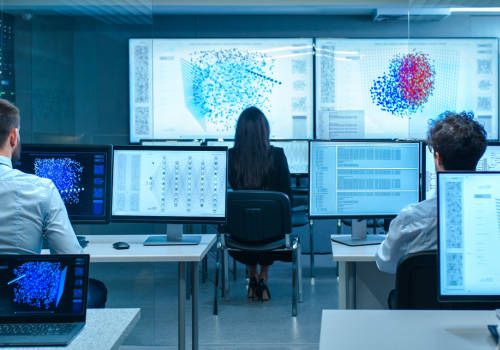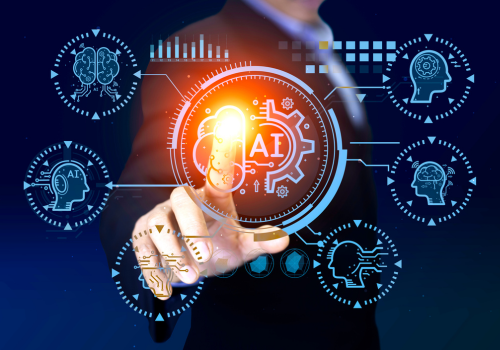ChatGPT first came out to the public on November 30, 2022, and people loved what it could do. In about a year's time, it grew from a tool for writing and coding help into something huge used by over 92% of big companies. This year, Sam Altman, the CEO of OpenAI—the company behind ChatGPT—spoke to the Senate about why AI, like ChatGPT, is important and why rules are needed to manage its power.
AI, or Artificial Intelligence, refers to “the ability of a digital computer or computer-controlled robot to perform tasks commonly associated with intelligent beings.” ChatGPT, a chatbot that disperses knowledge for users through data and computing techniques to predict answers is only one of the many AI tools available on the market. With the rise of artificial intelligence and its heightened impact on society, people discover more ways to use AI in work and daily life. New jobs are being created, and more and more jobs are taken over by AI.
AI's Impact on College Majors and Future Employment
“You know, AI can do your job,” or “AI will replace you in a matter of time” is something you’ll commonly hear these days.
As AI advances, its impact on employment across college majors is profound. Fields like healthcare, business, engineering, and the arts will see job roles evolve with AI integration. Automation and data-driven decision-making will reshape job responsibilities, emphasizing the need for adaptable skills and proficiency in AI-related technologies in various professions.
Hence, when choosing a college major, perhaps consider how AI may affect the field in the future.
Book now to secure your spot.
Most Affected Majors by AI Advancements
The following is a list of majors that are mostly likely to be affected by the rapid advancements in the AI industry.

Data science and analytics
AI's advancement in automating tasks could potentially replace roles involving routine data processing, automated reporting, and simple predictive modeling.
Design
AI tools such as Dall-E and MidJourney that can generate images in seconds, has been appearing in the market and can be a potential disruptor of the graphic design industry.
Accountancy
The increasing automation of data analysis and financial reporting through AI technologies poses a potential risk to the future employability of accounting majors as these tasks become increasingly streamlined and performed by AI systems.
Marketing
AI's proficiency in data analysis and prediction suggests that market research analysts might face significant changes driven by AI's capabilities in interpreting data for effective marketing strategies and advertising placements.
Computer science and programming
AI may be used for select programming and development, while more advanced problem-solving will still be left to us humans.
Journalism and Media
Just as how ChatGPT can generate an essay about American presidents, AI technologies can generate news by processing legitimate facts.
Business and finance
Similar to data science and analytics, AI may be greatly used for assessments and analysis in this major.
Law
Research and document review may become the job of AI, while humans will still likely remain as interpreters of insight and advisors.
Medicine and Healthcare
The progression of AI in medicine and healthcare could potentially disrupt future employment opportunities by automating tasks such as administrative duties, data analysis, and even some aspects of telemedicine, which might impact the roles of administrative staff, analysts, and certain healthcare providers.
AI-Resilient Majors: Lesser Affected Fields
Here is a list of majors that are
most likely to be least affected by automation.

Social sciences and humanities
As the trend seems to follow, fields involving human experiences and values have a lesser chance of being overtaken by AI.
Psychology and counseling
Simply put, computer processing does not entail empathy that is required in such fields.
Education and teaching
While AI can be great for providing practice problems and feedback, mentorship and teacher guidance are still necessary to foster social-emotional development and human connection.
Fine arts and performing arts
AI may be able to generate images of countries reimagined as parents, movie-themed houses, and other outlandish fever dream-esque concepts. However, human creativity is still unique and is not likely able to be recreated solely with AI.
Healthcare professions
Roles involving patients and therapy require personalized care and empathy, which AI is not yet capable of providing.
Environmental sciences
Fieldwork and understanding humans' role in the environment require knowledge beyond what AI has yet to process.
Tech leader Mark Cuban maintains that artificial intelligence will be able to automate the vast majority of jobs that require technical and repetitive tasks. Essentially, majors requiring human interaction and social-emotional development are less likely to be replaced by AI, whereas traditional STEM majors are more subject to replacement.
While people may feel that their livelihoods being altered by recent advancements in AI is a novelty, this notion has been categorized by John Maynard Keynes since the 1930s as “technological employment”. From tailors fearing sewing machines to lamplighters protesting against electricity, technology has created fear amongst those in a society resistant to change.
Yet at the same time, fear of AI is what pushes such technology in a positive direction. According to a recent MITRE and the Harris Poll, 78% of respondents had suspicions of the link between AI and malice, 82% were proponents of government regulations of AI, and 70% wanted the tech industry to have better means of protecting the public.
Industry-Government Collaboration: AI Regulation

OpenAI's CEO Sam Altman echoes these sentiments during the last senate hearing. He highlighted the impending job impact, emphasizing the necessity for collaboration between industry and government, especially urging governmental action to address mitigation strategies. However, he expressed optimism about the promising nature of future jobs.
Christina Montgomery, IBM’s chief privacy and trust officer emphasizes, “At its core, A.I. is just a tool, and tools can serve different purposes,” adding that Congress should take a “precision regulation approach to A.I.”
AI is a double-edged sword, representing both an incredible societal advancement where machines can perform highly intelligent tasks and a potential threat to jobs and livelihoods. However, in this world of AI, our creativity and curiosity remain irreplaceable. Whether you're choosing a college major or already on your academic journey, remember the significance of these human qualities. Without humans asking questions, answers would be left unknown.
Check out our A-GPA Academic Boost Program!
